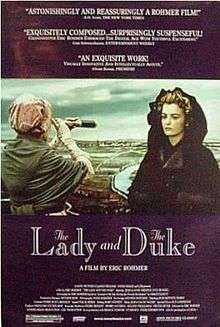The Lady and the Duke
| The Lady and the Duke | |
|---|---|
 | |
| Directed by | Éric Rohmer |
| Starring |
|
Release dates |
|
Running time | 129 minutes |
| Country | France |
| Language | French |
| Budget | $6 million |
| Box office | $1.9 million[1] |
The Lady and the Duke (French: L'Anglaise et le Duc) is a 2001 feature film by French director Éric Rohmer. The film was inspired by Ma vie sous la révolution, the colourful memoirs of Grace Elliott, an Edinburgh-born royalist caught up in the political intrigue following the French Revolution.
According to a description of the film in The Guardian, Rohmer's "customary verbal sparring and complex intellectual arguments are spiced by lavish sets, suspenseful plotting and the continuous threat of violence."[2]
Cast
- Jean-Claude Dreyfus as Duke of Orléans
- Lucy Russell as Grace Elliott
- Alain Libolt as Duke of Biron
- Charlotte Véry as Pulcherie the Cook
- Rosette as Franchette
- Léonard Cobiant as Champcenetz
- François Mathouret as Dumouriez
- Caroline Morin as Nanon
- Marie Rivière as Madame Laurent
- Héléna Dubiel as Madame Meyler
- François-Marie Banier as Robespierre
Reception
The film was criticised by many viewers in France because of its uncompromising presentation of revolutionary violence; some described it as reactionary or monarchist propaganda. Asked about this, Lucy Russell remarked: "There does seem to be a great problem, not just in France, but every country has problems facing up to the nasty parts of its history. But there's a reason it was called the Terror."[2]
References
- ↑ http://www.jpbox-office.com/fichfilm.php?id=2195
- 1 2 Akin Ojumu (30 December 2001). "Roads lead to Rohmer". The Guardian. Retrieved 2 November 2015.
External links
- The Lady and the Duke at the Internet Movie Database
- The Lady and the Duke at Rotten Tomatoes
- The Lady and the Duke at Metacritic
- The Lady and the Duke at Box Office Mojo
r